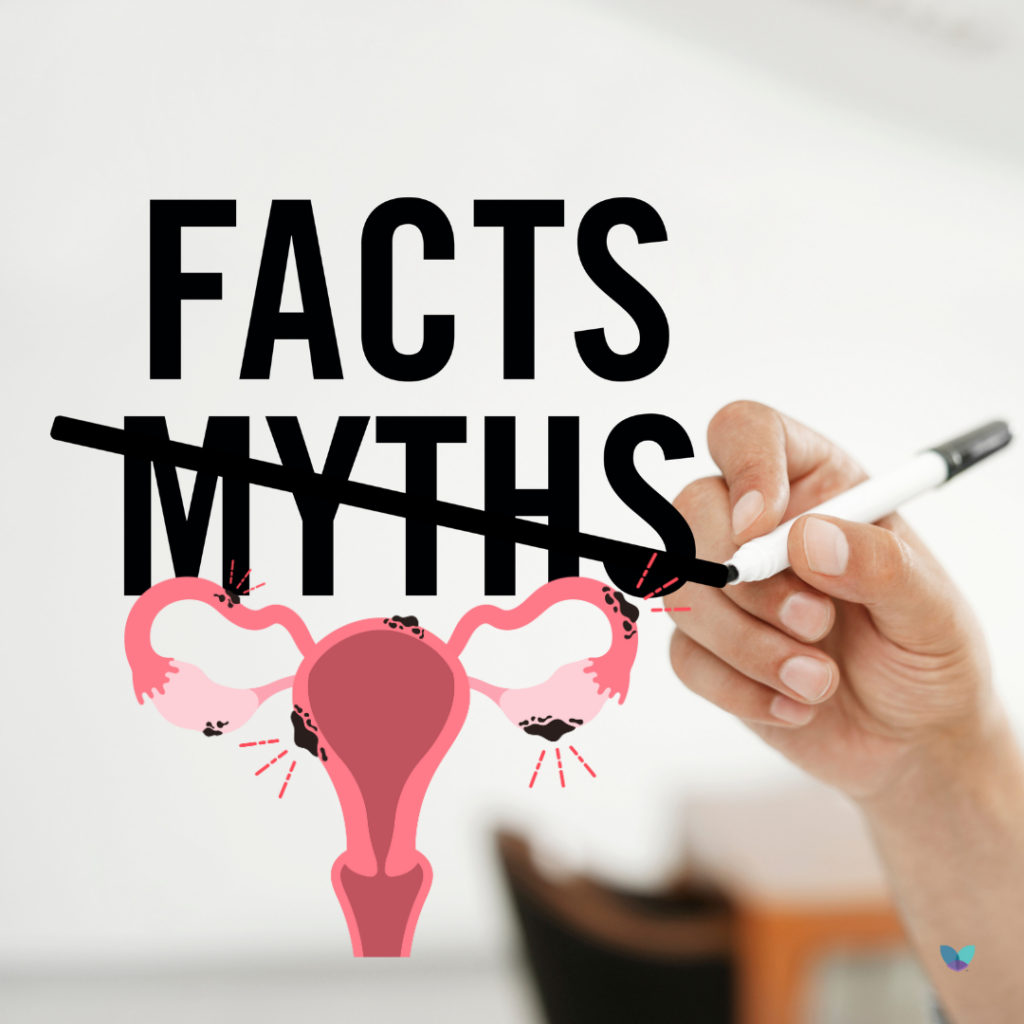Endometriosis is a systemic, inflammatory disease process that affects millions of patients worldwide. Despite its prevalence, there is still a significant amount of misinformation surrounding the disease and its treatments. One of the most misunderstood aspects is endometriosis excision surgery. We want to address common endometriosis myths, particularly those related to excision surgery, and provide reliable information about this condition and the treatments available.

Learn more about endometriosis
Myth 1: Endometriosis Excision Surgery is a Cure
Fact: One of the most pervasive myths about endometriosis is that excision surgery is a cure. While excision surgery is considered the gold standard for removing endometriosis lesions, it is not a cure.
Endometriosis is a chronic condition, and while surgery can significantly reduce symptoms and improve quality of life, it does not eliminate the disease entirely. Patients may still experience endometriosis symptoms post-surgery and may require additional treatments, including addressing residual inflammation of the nerves and dysfunction of the pelvic floor.
Myth 2: All Surgeons Are Qualified to Perform Excision Surgery
Fact: Not all surgeons have the specialized training required to perform excision surgery effectively. It is a highly skilled procedure that should be carried out by an experienced surgeon who specializes in endometriosis and uses the latest technology available in laparoscopy.
We want to emphasize that general gynecologists may not have the expertise needed to identify and excise all endometriosis lesions, which can lead to incomplete treatment.
At Pelvic Rehabilitation Medicine, we are proud to have three of the only 100 excision specialists available to perform laparoscopic surgery.
Myth 3: Excision Surgery Is the Same as Ablation
Fact: Excision surgery and ablation are not the same. Ablation involves burning the surface of endometriosis lesions, which can leave deeper parts of the lesions untreated. In contrast, excision surgery involves cutting out the lesions entirely, which is more effective in managing the disease. Understanding the difference between these procedures is crucial for making informed decisions about treatment options.
Learn more about excision surgery at PRM
Myth 4: Recovery from Excision Surgery Is Long and Painful
Fact: While recovery from any surgery involves some discomfort, the recovery period for excision surgery is often shorter and less painful than many people fear. Advances in minimally invasive surgical techniques, such as laparoscopy, have significantly improved recovery times. Most patients can return to normal activities within a few weeks, although full recovery may take a few months.
Additionally, our endometriosis specialists continue to check in with patients following their surgeries, ensuring they are recovering well and providing any advice needed to aid in that recovery. Our data shows that patients who receive excision surgery from a PRM surgeon have enhanced surgical outcomes.
COMING SOON: Download the Post-Excision Guide Now
Myth 5: Excision Surgery Guarantees No Recurrence of Symptoms
Fact: Although excision surgery is highly effective in reducing symptoms and improving quality of life, it does not guarantee that symptoms will never return. Endometriosis can recur, and ongoing management, including hormonal treatments and lifestyle changes, may be necessary to maintain symptom relief.
At PRM, we provide a treatment that directly targets inflamed nerves and spastic muscles of the pelvic floor. Endometriosis creates an inflamed environment, which causes additional pain and symptoms. By addressing these residual issues, we help our endometriosis patients to continue their healing and avoid gaining additional comorbidities.
Learn more about the comorbidities associated with endometriosis
Understanding Endometriosis Symptoms
Recognizing endometriosis symptoms is crucial for early diagnosis and treatment. Common symptoms include:
- Pelvic pain, particularly during menstruation
- Pain during intercourse
- Pain with bowel movements or urination
- Heavy menstrual bleeding
- Fatigue
- Infertility
Are you experiencing any of these symptoms? Take our endometriosis symptoms quiz to learn more.
Learn More About Endometriosis
Dispelling myths about endometriosis and its treatments is essential for empowering patients and improving their quality of life. Endometriosis excision surgery is a powerful tool in managing the disease, but it is not a cure-all. By understanding the facts and myths about endometriosis, patients can make informed decisions about their health and seek the best possible care.
Our team is passionate about bringing accurate and relevant information about endometriosis to those who need it. The Pelvic Rehabilitation Medicine blog is constantly updated with new information. Find more information here.
If you are experiencing the symptoms of endometriosis and considering endometriosis excision surgery, schedule a consultation with one of our excision surgeons today.
